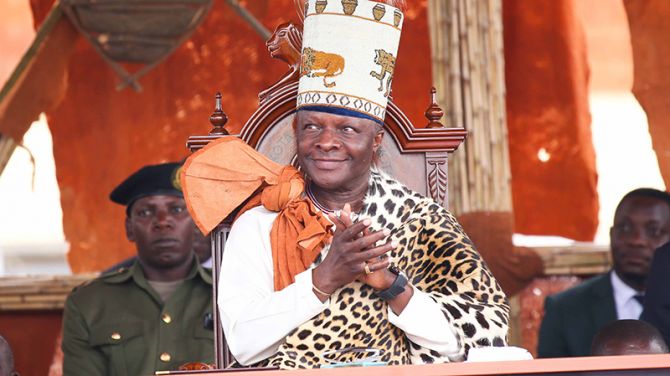
King of Buganda, UNAIDS Goodwill Ambassador for ending AIDS among men in East and Southern Africa
The Kingdom of Buganda, under the leadership of His Majesty Ronald Muwenda Mutebi II, has been actively involved in the efforts to end AIDS as a public health threat by 2030. Buganda is the traditional kingdom of the Baganda people within Uganda. The King (also known as Kabaka) of Buganda, His Majesty Mutebi II, has, over the course of his reign, used his considerable influence to champion health and wellbeing for his subjects - spearheading campaigns to, amongst others, promote HIV awareness.
In March 2017, UNAIDS appointed the King of Buganda as a UNAIDS Goodwill Ambassador on Ending AIDS among men in East and Southern Africa to influence norms, beliefs and customs to improve men’s access to HIV services. Throughout East and Southern Africa, men and boys are less likely to test for HIV, to initiate antiretroviral therapy and to remain engaged in care and are therefore dying of AIDS-related illnesses and many other diseases at disproportionately higher rates than their female counterparts.
As part of his ambassadorial role, the Kabaka launched an HIV advocacy campaign called “MEN ARE STARS - ABAAMI MUNYENYE” The aim of the campaign was to sensitize and mobilize a critical mass of men and boys in Uganda and throughout East and Southern Africa to access HIV services. The campaign targeted men and boys between the ages of 15 and 49 years within 25 high HIV burden districts. One of the main ways which the Men are Star’s campaign reached men was through popular sporting events. These included the Kabaka Birthday Run Marathon attracting 50 000 to 60 000 participants (85% of whom are male), and the Masaza Football Cup attracting 60 000 to 70 000 fans.
Other initiatives included use of the Kingdom’s radio station and television station to communicate advocacy messages for the campaign, as well as organizing traditional campfire events for adolescent boys and young men. In total, the project aimed to directly reach over 7 million Ugandans (and via a multiplier effect, more than double that number), through the combined platforms of sports, radio and television stations, community dialogues, edutainment at schools, churches, and mosques, as well as via social media and the Abaami Munyenye Twitter account. The content of the messages focused on mobilizing adolescent boys to prevent HIV through voluntary male circumcision, and mobilizing men and boys to test for HIV, to adhere to treatment to reduce viral load. The campaign also stimulated discussion on social and structural drivers of HIV such as harmful gender norms, gender-based violence, stigma and discrimination. The campaign aimed to shift gender norms by encouraging men to be involved with the health care of their partners and children, and to engage in discussions about family planning with their partners.
The campaign contributed to significantly improved HIV-related outcomes in the Buganda region between 2016 and 2020 including:
- Increased knowledge of HIV status from 89% to 94%
- Increased HIV treatment coverage from 64% to 92%
- A 52% decrease in new HIV infections.
A closer look at the HIV treatment cascade data in 2020 showed a great improvement amongst men and boys. As the Men are Stars campaign is the only one in the Buganda region which has focused on improving mens’ HIV- and health-related behaviour, it certainly seems as if the campaign has contributed towards these improved outcomes. In addition, the campaign has made a contribution to Uganda’s commendable achievement of the 2020, 90-90-90 targets - one of only eight countries globally that managed to do so.
As result of this campaign, in 2022, the UNAIDS Executive Director re recognised the King of Buganda as UNAIDS Good Will Ambassador for Africa engaging men and boys to End AIDS by 2030.
The Kingdom of Buganda's proactive approach under the leadership of His Majesty Ronald Muwenda Mutebi II exemplifies a powerful commitment to public health and social change. By leveraging cultural influence and community engagement, Kabaka’s initiatives have made significant strides in addressing societal enablers of HIV, promoting health awareness, and challenging harmful gender norms. These efforts not only aim to end AIDS as a public health threat by 2030 but also foster a healthier, more informed, and inclusive society.
